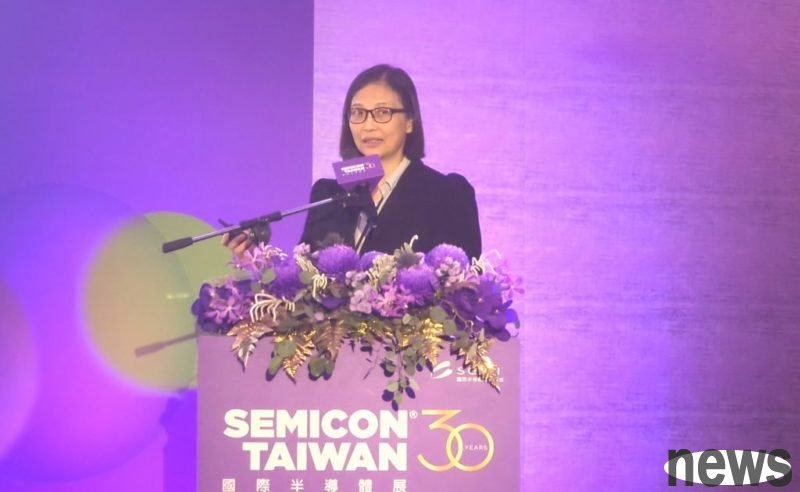
Xu Xiulan, chairman of the Silicon Grid Corporation, the Silicon Grid Corporation, pointed out that in recent years, the strategic focus of global semiconductor industry has shifted from traditional internationalization to localization or localization. Advanced process capacity (such as 1 nanometer, 2 nanometers) is even considered a "weaponize" discussion tool. However, the future competition and risks of the industry are no longer limited to the most cutting-edge process technology or large packaging capabilities, but are gradually shifted to the mastery of "key materials".
Xu Xiulan said during a theme lecture at Semicon Taiwan's pre-exhibition journalist's conference on the 8th that if the semiconductor industry fails to effectively grasp the key materials, it may not know where the "choke point" of its supply chain is, and then faces the situation of a stuttering. These small things that may stuck the industry and cover a wide range of areas, such as special chemicals, special gases, certain types of grinding powder, etc. Although advanced processing and packaging capabilities are still important, too many key ingredients have become new potential bottles.
Xu Xiulan said that Taiwan's semiconductor industry plays a very important role on the global stage, with many leading companies such as Taiwan Electricity, Sun and Moonlight, and Joint Development Technology. However, Taiwan’s important position is only further highlighted after many challenges. For example, during the COVID-19 epidemic and earthquakes and other disasters have triggered global concerns about chip supply chains, and paid special attention to the supply of vehicle chips. This has led countries to start requiring the "Taiwan +1" strategy. In addition to Taiwan factories, they also need to set up overseas to prevent urban lockdowns or disaster risks. Nowadays, "Taiwan +1" is insufficient, and the market even sounds of "No China, No Taiwan" are available, requiring industries to set up operations in more regions to ensure the stability of supply chains. Therefore, industry competition has extended from a single pure production capacity and technology to whether you can effectively master the key materials.
Xu Xiulan pointed out that the complexity of key materials is much higher than that of process technology, because it is difficult to stock up and the dosage is not large, but it is indispensable. There are many types of these materials, including rare earths, high dielectric constant (Hi-K) materials, photoresist additives, chemical mechanical planarization (CMP) abrasives, special gases (such as rare gases that have attracted attention in the Ukrainian War), electronic-grade special chemicals, etc. And two of these are particularly worthy of attention:
First is Silicon Carbide (SiC), and despite years of discussion, there are still a few countries around the world that can produce large-size, high-cost-effective SiCs. Due to its excellent heat-guiding performance, SiC has great potential in future high heat dissipation applications, and it is far superior to glass and silicon. Countries have requested supply chains “de-Sinicization”, and even “non-China, Africa and the United States”, making Taiwan one of the key suppliers.
The other is Gallium. Since pods usually exist in the form of compounds, about 90% of the world's exports are currently concentrated in a specific country - China. Exports of the electrodes are now required, which means that many industries will be impacted once a supply chain has a problem. The supply chain properties of these key materials are of great importance. Even with diversified suppliers, if these suppliers encounter sudden outbreaks such as power outages or earthquakes, the goods may still not be able to be shipped.
Xu Xiulan emphasized that the global economic model is changing from the pursuit of low-cost and high-efficiency "Just in Time" to a more focused strategy. This includes promoting localization, Net Zero, Circular Economy, and the thinking from "instant" to "just in Case". Although this transformation will lead to increased costs and reduced economic efficiency, it is a necessary way to ensure that supply chains are permanent and reserved.
In order to address these challenges, Xu Xiulan also said that the future development direction of Taiwan's semiconductor industry, including the increase in material autonomy, that is, the government should encourage the gradual production of key and easily jammed materials in Taiwan. In terms of environmental sustainability and creativity, we will definitely find alternative gases and chemicals that are friendly to the environment and promote international cooperation. Currently, Taiwan has companies developing regenerative photoresist, regenerative gas and IPA recycling technologies, which are all in the right direction.
Finally, in terms of talent and policy, ensure that the industry has sufficient talent investment, formulate appropriate policies, and continue to pay attention to Taiwan's positioning in the global semiconductor supply chain. Overall, Taiwan’s semiconductor industry should not only maintain its “strength” strength, but also pursue “stable” stability and “permanent”, and ensure the stability of the supply chain through independent research and development, international cooperation and competition.
